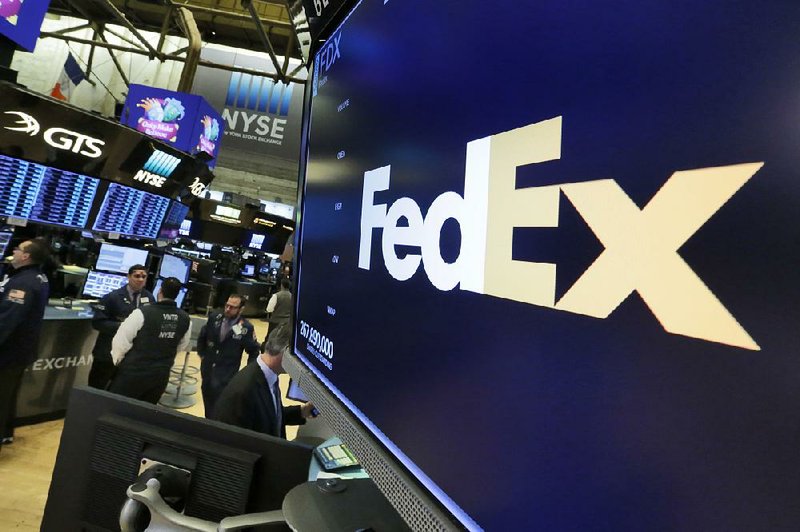FedEx Corp. has slashed its profit outlook again, and Wall Street's patience is running out.
At least four analysts downgraded the stock, sending shares tumbling by the most in four years. While FedEx said trade tensions were weakening the global economy and sapping demand for parcel deliveries, the company's critics emphasized "elusive" business execution, an insufficient grip on costs and "acquisition debacles."
Investors' mounting frustration underscored FedEx's inability to keep up with even its own weakening expectations. The company has been making a habit of cutting its earnings forecast or missing analysts' estimates while trailing the shareholder returns of rival United Parcel Service Inc. In addition to economic headwinds, FedEx is walking away from most business with Amazon.com Inc. and still struggling to integrate a Dutch company it acquired in 2016.
"This is, I think, the fifth straight quarter of either missing numbers or cutting guidance," Wolfe Research's Scott Group told FedEx Chief Executive Officer Fred Smith and other company leaders on a conference call late Tuesday. "We need some hand-holding here."
Smith said spending by U.S. consumers was masking weakness in production of goods, which is more global and played a big part in the soft beginning to FedEx's new fiscal year.
The shares plunged almost 13% to $150.91 Wednesday in New York after sliding to as low as $148.50 for the biggest intraday decline since August 2015. UPS fell only 1.1% while Deutsche Post AG slipped 1.2%.
FedEx's tumble wiped out its year-to-date gain. Even before the drop, the shares were already lagging UPS and a Standard & Poor's index of U.S. industrial companies.
Profit at FedEx fell 11% in its fiscal first quarter.
The company added that it was lowering its profit outlook for the rest of the fiscal year -- through next May -- partly because of the loss of ground-based shipments from Amazon. FedEx ended a contract with Amazon last month, having previously decided not to renew an air-shipping contract withthe e-commerce company.
FedEx's quarterly profit of $745 million was down from $835 million a year earlier. Revenue was flat at $17.05 billion, also below analysts' forecasts.
An economic slowdown in Europe is hampering FedEx's effort to turn around operations at TNT Express, a Dutch company FedEx acquired in 2016 for $4.8 billion. Integration spending will be about $350 million over the 12-months ending in May 2020, FedEx said in June, pushing the expected total to about $1.7 billion by May 2021.
FedEx said it now expects full-year earnings of between $11 and $13 per share, excluding TNT integration costs and an accounting adjustment related to a pension plan. Analysts had been expecting $14.68 a share, according to FactSet.
FedEx is also raising prices. It announced Monday that it will raise rates on express, ground and home deliveries by an average of 4.9% starting Jan. 6. Freight rates will rise 5.9%.
Deutsche Post responded to FedEx's warning by saying that it hasn't seen changes in volume trends since its most recent comments in August. UPS said it hasn't detected a broad-based slump.
"UPS has seen softening in some markets as customers react to trade uncertainty, but has not experienced broad dampening," the Atlanta-based courier said in a statement. "The company continues to manage costs and adapt its network to take advantage of growth opportunities as sourcing patterns shift among markets."
FedEx blamed Tuesday's profit warning on global economic weakness "driven by increasing trade tensions and policy uncertainty."
It's not alone in that opinion: The Business Roundtable's CEO Economic Outlook Index fell in the third quarter to the lowest since late 2016, the group said Wednesday. More than half of chief executives said U.S. trade policy and retaliation from other countries had a negative effect on sales over the past year, while a third said it was having a similar impact on hiring.
Still, FedEx analysts said there's a limit to the blame that the Memphis-based company can heap on the economy.
Citigroup Inc. analyst Christian Wetherbee called the outlook cut "drastic." KeyBanc Capital Markets analyst Todd Fowler cut FedEx to hold from buy, saying the company's execution of its strategy has been "elusive."
Deutsche Bank AG's Amit Mehrotra, who also downgraded the stock to hold, sounded a similar note and said the company had spent too much on planes for its Express air-shipping business.
"In reality, FedEx's release is largely the result of many management missteps over the years, including overspending on aircraft despite weaker returns in Express over the long-term, and acquisition debacles," Mehrotra said.
The weaker outlook underscored the hurdles for FedEx as the company introduces costly changes to its ground network to handle surging e-commerce deliveries.
FedEx stuck with its plan to invest $5.9 billion for fiscal year 2020, which ends in May, and will probably match that in 2021, Chief Financial Officer Alan Graf said. The company needs to spend on more fuel-efficient aircraft and to modernize sorting hubs, Graf said.
But to reduce capacity at the Express air-shipping network, FedEx will retire as many as 20 older planes and park additional jets as it adjusts to the weaker economic outlook. The company already announced a $575 million employee-buyout program in January.
Information for this article was contributed by Thomas Black, Sam Unsted, Chiara Remondini, Richard Weiss and Bailey Lipschultz of Bloomberg News and by David Koenig of The Associated Press.
Business on 09/19/2019
